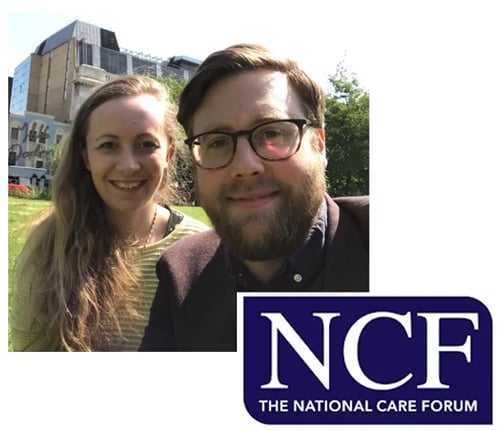Last week, I was lucky enough to spend some time discussing data and digital for social care with Tommy Henderson Reay, one of the two Digital Transformation Leads of the National Care Forum (NCF), alongside Claire Sutton. His insight into the potential of digital and data for the social care sector is captivating. In this special blog article, I share this future vision with you all.

Tell me about your background and current role.
My name is Tommy Henderson Reay and I am a registered social worker. My background was initially in substance misuse social work, and then I moved into community social work, and then hospital social work. That’s where I started to interact with care providers because I was commissioning care plans and working with people moving into a care provider setting.
After about 5 years and then I worked for NHS Digital and I was part of their clinical informatics fellowship where I took my experience from front line social work and applied that in a national setting with NHS Digital, helping them with their work nationally with social care and its integration with health, and providing the valuable insight from my practice and how it relates to people who are receiving support in social care.
Then that led me to my role with the National Care Forum. I now work as one of two digital transformation leads for the NCF, and we represent over 100 not-for-profit care providers. So, I suppose, the role is about advocating and championing digital within our sector and for our members - supporting them with guidance through the process of engaging with digital or providing support if they are already digital. And at the same time, liaising with some of the other big, major stakeholders in social care nationally, ensuring that care providers voices are heard and represented.
Why do you feel using data and digital transformation is important for social care?
Well, how better to work out whether what you are doing is the right thing for a person than to look at and reflect on what you’ve done. As a social worker I was always taught to reflect and, in my mind, using data is merely a way of reflecting on what you have done. But if you don’t have that data to hand, how can you know whether what you have done is any good, and whether you are complementing the person or whether you are actually making it worse for the person? So, for me, the use of data is a way of informing yourself as a person, as a professional, but also your organization, as to whether you’re remaining person-centered and how you can complement the person. So, the use of digital is a great way of evidencing that.
It’s worth saying that I think we have a responsibility in care to really look after people. And so, by using data, you’re reinforcing that notion, showing evidence, and actually giving yourself confidence that what you’re doing is the right thing. And if it’s not (the right thing) then you’ve got the evidence to know what you should do better. And actually, one of the other things that is a real bugbear for me is that, therefore, social care data is eminently valuable across the sector. Be that for hospitals, GP surgeries, pharmacists, physiotherapists, occupational therapists. Whoever they are, social care data is really valuable. Not only internally amongst social care providers or the social care sector as a whole, it is also really valuable to other partners within the whole system. And if we’re not using that data properly, we are doing the person we’re caring for a disservice, but also we’re doing ourselves a disservice.
What do you think gold-standard use of data in social care would look like?
That is a really good question. Gold-standard would be up-to-date information, that’s client level, person-centric. It wouldn’t be burdensome. It would be very complimentary to the person. It would be something that could be understood by the person to some extent - obviously you’ve got to factor in things like cognition – but equally if there were capacity issues it has got to be something that is easily digestible and understandable to family members as well. So, gold-standard for me is informative data and thus informative care that informs the care that you give but equally is accessible and understandable to all. It is not a case of, you can understand it if you’ve got a certain level of academic prowess or whether you’ve got a degree in x, y or z, but it’s actually that good data should be understandable by all. So that’s what gold-standard would look like for me.
What thoughts do you have on how we could achieve this?
That’s really difficult to answer – how could we achieve this? I think you’ve got to start from the ground-up rather than from top-down, because I don’t think top-down works as it’s very hard to mandate anything in social care because so many care providers are privately organisations so it’s hard to say what they should do. But I think what you have to say is, what would be the value in gold-standard, and highlighting that.
And so, I think you start from the ground-up. I think we’ve got to start by saying what would be a social care gold-standard and coming to some form of consensus as a sector as to what we think that would be. I think that is going to be a challenge because social care is so varied as a sector. But given that the Green Paper is delayed and we don’t know when it will be published, and given that we’re not entirely sure what support is there from the government, I think it’s really important that we collaborate as a sector, and we try and unite as a sector, so that we can come to some form of an agreement. I mean, there’s no reason why social care couldn’t be the leader in gold-standard, and setting standards, and interoperability, but we need to agree that amongst ourselves. And if we were to do that, I think we’d go a long way to achieving that.
What does gold-standard collaboration between the health and social care sectors look like?
Gold-standard in terms of health and social care would be that information that is pertinent to a person’s care could be transferred seamlessly between settings regardless of whether that was a primary or secondary care setting, or whatever social care setting that was. Imagine it’s your banking, and you’re trying to share funds between two banks, but you weren’t allowed to send information to a particular bank account because your bank didn’t have that relationship. You’d be furious, there would be uproar, and society would say that is not acceptable. But when it comes to your own care, that is what happens, and that’s not acceptable. And I would argue that someone’s care is perhaps more valuable than their money, but with money it works but with care it doesn’t.
So, gold-standard would be the ability to share that information regardless of your setting. So, we’ve been working as the National Care Forum towards promoting the use of NHS mail amongst care providers because that’s a really tangible, achievable way of sharing that information across settings in a secure way. And again, it highlights and reinforces the value of social care data to other stakeholders. So, for me, that gold-standard would be that no matter where you are or who you are, your information could be seen by whoever needs to see it so that the care they can give you is timely and most pertinent, and best suits you.
What are the boundaries/barriers between health and social care?
The biggest boundary of the lack of understanding. I don’t think the NHS, and I don’t think that health in general, understand what social care is, if I’m honest. I don’t think social care helps itself because it doesn’t have a brand, it doesn’t have an identity in the same way that the NHS does. So, for example, at least 40% of the general public think that social care is funded by the NHS. They don’t realise that social care is means tested, whereas the NHS is free at the point of care.
So, you’ve got at the base level, a lack of understanding in the general public and in health as to what social care is. So social care has a role to play in terms of saying what it is, and its identity. And it also needs to invest in its workforce so that it can have empowered individuals who can talk to and with the NHS, articulating what social care is and what its needs are at a higher, operational level. Now you might to some extent have that for local authorities, but I don’t think we have that for care providers, and I think that we need to invest in our workforce so that we do have social care professionals who can advocate for social care to the NHS. And I think it’s really important that we invest in that workforce, otherwise we’re going to perpetually reinforce the cycle of things being done by the NHS for social care, plopped onto social care at the last minute, and we’re expected to join in. Whereas, the only way that we are going to a) be part of the conversation or b) more aspirationally influence conversations or event instigate them is if we empower our individuals within social care to do that. So, we need to invest in our workforce to do that somehow.
Any final words?
I think it would be remiss for me not to talk about Digital Social Care. So, Digital Social Care is an initiative commissioned through NHS Digital to guide and empower social care providers in terms of information governance, use of digital technology, cyber security, and engaging with their digital journey. So, I would urge people to look at digitalsocialcare.co.uk and send us feedback and thoughts on content.
And, as the year goes on, we are going to be working on a very easily digestible how-to guide in terms of how to become more digitally literate as a social care provider, how to engage with data, how to talk to IT suppliers. Very practical things like, if you’re installing Wi-Fi in your care provider home, what would you do? What should you think about? If you’re going to go for a change from MARs to eMARs, what do you do? What questions should you be asking? What do the terminologies mean? If you’re going to go from written care plans to digital care plans, what should you be thinking about? Thinking about futureproofing, in 5-6 years’ time, what do you want to be looking for? Because digital is an intimidating journey for many people because there’s not much of a precedent, and if there is people don’t know who to talk to because often care providers are working in isolation. So, Digital Social Care is a way to try to address that, and to provide that support for care providers when thinking about when embarking on the digital journey.
Want to find out more?
Find out more about the work of the National Care Forum here
Find out more about the work of Digital Social Care here
Get in touch if you have any questions or would like to discuss ATLAS eMAR in more detail.
Find out more about ATLAS eMAR
“Social care data is really valuable, not only internally amongst social care providers or the social care sector, it is also really valuable to other partners within the whole system, and if we’re not using that data properly, we are doing the person we’re caring for a disservice, but also we’re doing ourselves a disservice.”
Tommy Henderson Reay
Digital Transformation Lead, National Care Forum
.png)

